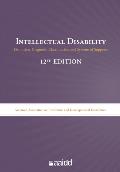Written by the AAIDD Ad Hoc Committee on Terminology and Classification:
Robert L. Schalock, Sharon A. Borthwick-Duffy, Valerie J. Bradley, Wil H.E. Buntinx, David L. Coulter, Ellis M. (Pat) Craig, ; Sharon C. Gomez, Yves Lachapelle, Ruth Luckasson, Alya Reeve, Karrie A. Shogren, Martha E. Snell, Scott Spreat, Marc J. Tassé, James R. Thompson, Miguel A. Verdugo-Alonso, Michael L. Wehmeyer, and Mark H. Yeager
This manual contains the most current and authoritative information and knowledge on intellectual disability, including best practice guidelines on diagnosing and classifying intellectual disability and developing a system of supports for people living with an intellectual disability. Written by a committee of 18 experts, Intellectual Disability: Definition, Classification, and Systems of Supports, 11th Edition is based on seven years of work on: (1) a synthesis of current information and best practices regarding intellectual disability; (2) numerous reviews and critiques of the 10th edition of the AAIDD definition manual; and (3) feedback from the field regarding a series of articles published by the Committee. This is the first official AAIDD definition manual with the terminology “Intellectual Disability.”
Featuring Best Practice Guidelines and Discussion for Professionals
Here’s how you can benefit from this best practice manual:
- Learn an authoritative definition and diagnostic system of intellectual disability designed to give you a thorough and step-by-step understanding of all the factors that go into determining intellectual disability.
- Consult expert guidelines on critical issues such as the role of assessment in the diagnostic process, challenges faced in quantifying intelligence, evaluating the role of IQ in making a diagnosis, and how to assess adaptive behavior.
- Understand key clinical judgment strategies to enhance the validity and precision of a clinician’s decision on the diagnosis of intellectual disability.
- Discover the relationship between the AAIDD System and other diagnostic systems.
- Read detailed discussions on the 10 dimensions of support areas in a person’s life and various approaches to individualized service planning.
- Learn about the unique needs of people with intellectual disability with higher IQs.
- Learn how to apply the AAIDD Definition System within special education systems, public policy initiatives, and provider organizations.
You may purchase the e-book version of Intellectual Disability by clicking here.
 Related Title
Related Title
User's Guide
This practical User's Guide to the 2010 AAIDD Intellectual Disability: Definition, Classification, and Systems of Supports manual informs clinicians, educators, policy makers, and program managers how to implement the various components of the AAIDD definition system in their specific job settings. The authors discuss the contemporary relevance of the supports-based AAIDD definition in the context of issues ranging from special education practices and IDEA mandates, to diagnosing individuals with higher IQ and conducting retroactive diagnoses. Policy makers and program managers will benefit from discussions on how the supports paradigm can improve quality outcomes, and how the current system incorporates the consensus in the field to utilize a supportsbased approach.
Praise for the 11th Edition
“The 11th edition of the AAIDD Definition Manual continues our progress in both describing a person with an intellectual disability in several dimensions, not solely based on IQ or Adaptive Behavior, and integrating further the concept of supports into the definition and practice. Refinements based on an extensive feedback system, both in the field and in peer-reviewed literature are incorporated making the 11th edition the most advanced tool of its kind.”
Steven M. Eidelman, Professor and Co-Director, National Leadership Consortium, University of Delaware
"An excellent, up-to-date reference enthusiastically recommended for college library collections and teh resource shelves of aspiring and practicising psychologists."
Library Bookwatch, February 2010
“An indispensable desk-top reference and primer on assessing intellectual disability that includes a compendium of leading practices on structuring effective life-long supports.”
Renee L. Pietrangelo, CEO, ANCOR
__________________________________________________________________
Coming January 2021
 Intellectual Disability: Definition, Diagnosis, Classification, and Systems of Supports, 12th Edition
Intellectual Disability: Definition, Diagnosis, Classification, and Systems of Supports, 12th Edition
The AAIDD definition manual leads the field in understanding, defining diagnosing, and classifying the construct of intellectual disability (ID). The 12th edition – the first in 10 years – includes new findings and developments from the last 10 years, including the planning of supports for people with ID.
It will be available from the AAIDD bookstore by the end of January, 2021.